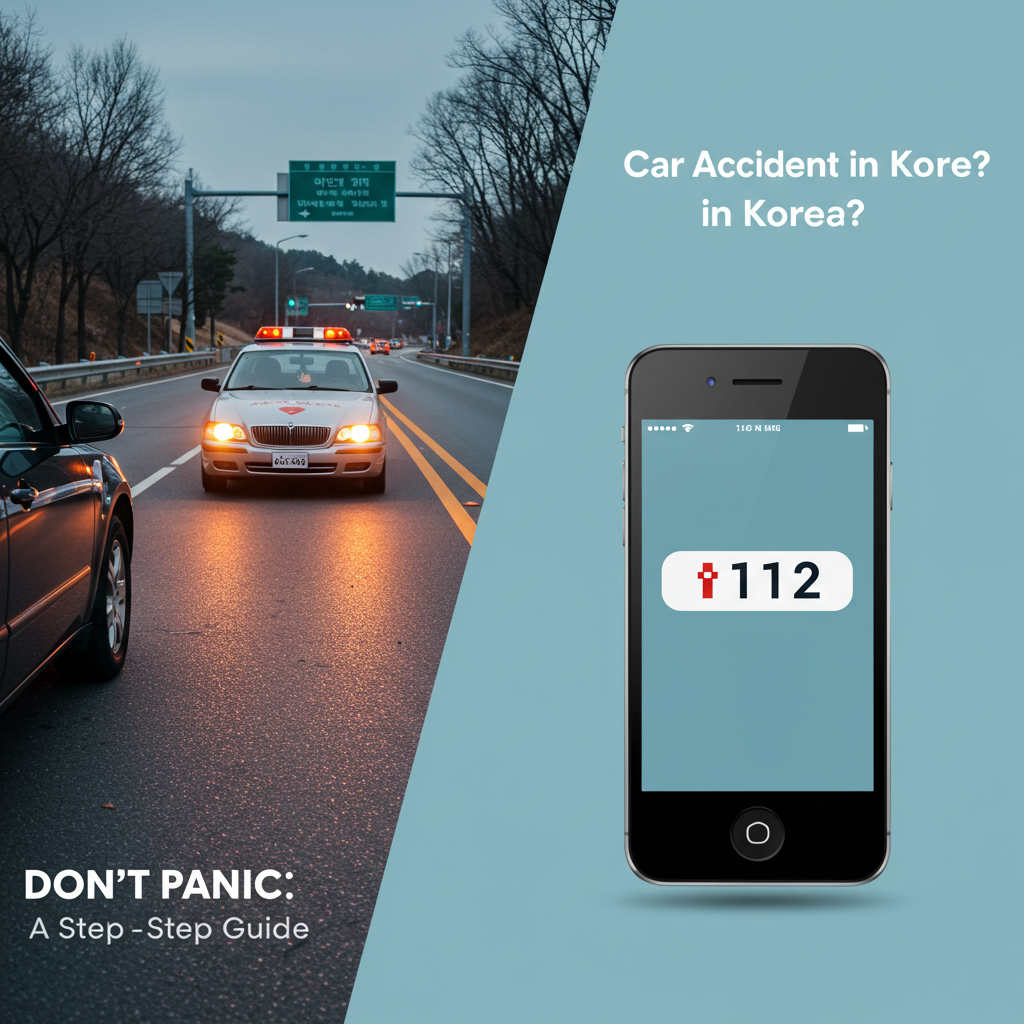Don't Panic: A Foreigner's Step-by-Step Guide to a Car Accident in Korea
Hello, fellow world travelers, and welcome back to TripGoGo. Today, we're tackling a topic that's less about the joys of travel and more about being prepared for the unexpected: what to do if you get into a car accident in South Korea.
It's a scary thought. The language barrier, the unfamiliar procedures... it can feel overwhelming. But take a deep breath. By following these steps, you can navigate the situation calmly and correctly. The key is to stay calm and act in the right order.

Table of Contents
- 1. Immediate Actions: 3 Things You Must Do First
- 2. Calling for Help: Who to Call and What to Say
- 3. Documentation is Everything: How to Gather Evidence
- 4. Contacting Insurance: Rental Car vs. Personal Policy
- 5. After the Scene: Hospital Visits & Police Reports
- 6. Essential Korean Phrases: A Lifesaving Cheat Sheet
- 7. FAQ: Your Questions Answered
- 8. Conclusion: Your Safety Comes First
📸 여기에 [도로 갓길에 비상등을 켜고 서 있는 두 대의 차] 이미지를 삽입하세요
(기본 모드에서 이 영역을 클릭하고 이미지 업로드)
1. Immediate Actions: 3 Things You Must Do First
In the shock of an accident, your mind can go blank. Just remember these three steps.
- Stop the Car & Turn on Hazard Lights: To prevent a second accident, stop your vehicle immediately and turn on your hazard lights (the button with a red triangle).
- Check for Injuries: The absolute first priority. Check yourself, your passengers, and the people in the other vehicle. If someone is seriously injured, do not move them unless they are in immediate danger.
- Move to a Safe Location: If the cars are drivable, move them to the side of the road. If not, get out of the car and wait in a safe place, like behind a guardrail.
2. Calling for Help: Who to Call and What to Say
Korea's emergency numbers are simple.
- Police: 112 - Call them to report the accident and for traffic control. You can say, "Gyotong-sago-ga nass-eoyo" (I had a car accident).
- Ambulance: 119 - Call if anyone is injured. You can say, "Saram-i dachyeoss-eoyo" (Someone is hurt).
- Interpreter Services: When you call 112 or 119, you can request an interpreter. Just say "English, please," and they can often set up a three-way call.
3. Documentation is Everything: How to Gather Evidence
This is the most critical step for determining fault and for insurance claims. While waiting for the police, do the following:
- Take Photos & Videos: Get wide shots of the entire scene and close-ups of the damage on both vehicles from multiple angles. The other car's license plate is a must. Your dash cam ("black box" in Korea) footage is your best evidence.
- Exchange Information: Get the other driver's name, phone number, and insurance company. You'll need to provide yours as well (driver's license, phone number, insurance info).
📸 여기에 [스마트폰으로 자동차 파손 부위를 촬영하는 손] 이미지를 삽입하세요
(기본 모드에서 이 영역을 클릭하고 이미지 업로드)
4. Contacting Insurance: Rental Car vs. Personal Policy
- If You're in a Rental Car: Call your rental company immediately. Their contact number is usually on a sticker on the car. They will guide you through their specific accident procedure.
- If It's Your Personal Car: Contact your Korean insurance provider to report the accident.
5. After the Scene: Hospital Visits & Police Reports
- Go to the Hospital: You might feel fine due to adrenaline, but pain can appear later. Always get a medical check-up. The doctor's report (진단서, jindanseo) is crucial for claiming medical expenses from insurance.
- Get the Police Report: If the police came to the scene, you can later get an official "Certificate of Traffic Accident" (교통사고사실확인원) at a police station. This is often required by insurance companies.
⭐ Essential Korean Phrases: A Lifesaving Cheat Sheet
- 교통사고 (Gyotong-sago): Car Accident
- 경찰 (Gyeong-chal): Police
- 보험 (Bo-heom): Insurance
- 병원 (Byeong-won): Hospital
- 괜찮으세요? (Gwaenchan-euseyo?): Are you okay?
- 도와주세요 (Dowa-juseyo): Help me

FAQ: Your Questions Answered
Q: It was just a small fender-bender. Do I really need to call the police?
A: It's highly recommended. While you can sometimes settle minor accidents directly through insurance, filing a police report protects you if the other party changes their story later.
Q: I think the accident was my fault. What should I do?
A: Do not admit 100% fault at the scene. Be polite, apologize for the situation, and check if the other person is okay. The final fault ratio will be determined by the insurance companies based on evidence.
Q: We can't communicate at all. What now?
A: Use a translation app like Papago or Google Translate. Showing a simple written phrase like "보험사 부르겠습니다" (I will call my insurance company) can be very effective.
Conclusion: Your Safety Comes First
Getting into a car accident in Korea is stressful, but it's manageable. We hope this guide serves as a beacon of calm in a difficult situation. Remember, the most important things are to stay composed and prioritize everyone's safety.
And the best way to prepare for such an unfortunate event is by having reliable travel insurance. From medical bills to potential legal issues, a solid insurance plan is the ultimate safety net that protects your entire trip.




